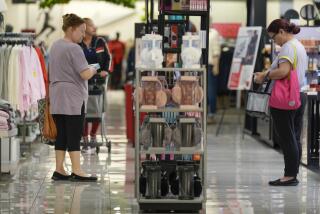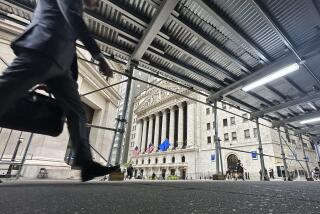December Retail Sales Climb a Minuscule 0.3%
WASHINGTON â The holiday shopping season ended on a sour note in December as retail sales rose an anemic 0.3%, according to a government report released Tuesday. Consumer confidence, meanwhile, sank to a two-year low.
Many analysts said the two reports underscore how pronounced the economic slowdown has become and that they increase the chance that the Federal Reserve Board will cut short-term interest rates today.
âThese numbers donât indicate the economy is sliding into recession, but they do indicate that monetary policy probably should be relaxed from its current restrictive stance,â said economist Lynn Reaser of First Interstate Bancorp in Los Angeles.
The two reports also heightened expectations on Wall Street of a rate cut. The Dow Jones industrial average surged 76.23 points to close at 5,381.21 on Tuesday, its fifth record in the last seven sessions.
Still, some analysts said they believed the Fed would keep rates steady until it can study data whose release was delayed by the federal government shutdown and East Coast blizzard.
âIn my view, the Fed will need to discern a pattern of generalized slowdown running through the fourth quarter and past the blizzard into this quarter before committingâ to another rate cut, said economist David C. Munro of High Frequency Economics in New York.
The Federal Open Market Committee, which has lowered the so-called federal funds rate--the overnight rate banks charge one another--twice in the last seven months, was meeting Tuesday and today to consider whether further economic stimuli are needed.
Tuesdayâs Commerce Department report on retail sales shows a lackluster shopping season in which consumers spent a seasonally adjusted $198.6 billion, up just 0.3% from $198 billion in November.
But the department said retail sales in November were weaker than initially estimated, rising 0.7% rather than 0.8%. They had fallen in both September and October.
Retail sales represent about half of total consumer spending, and the holiday shopping season can account for as much as half of a retailerâs yearly profits.
For the year, sales rose 4.9% above 1994, to $2.3 trillion. It was the smallest advance since sales edged up 0.6% in 1991 as the last recession was ending.
The December advance was just half of what many analysts had predicted. And the weakness was broad-based, with sales down at home furnishing, building material, department and apparel stores.
Auto dealers posted a 0.7% increase in sales, but many analysts attributed much of that growth to end-of-year clearance sales.
In another sign of economic sluggishness, the Conference Board said its index measuring consumer confidence plunged 12 points in January to 87, the lowest since an 86.7 reading in March 1994.
(BEGIN TEXT OF INFOBOX / INFOGRAPHIC)
Retail Sales
Seasonally adjusted, in billions of dollars:
Dec. 1995: $198.6
Source: Commerce Department
Consumer Confidence Index, from a monthly survey of 5,000 households. 1985=100:
Jan. 1996: 87
Source: Conference Board
More to Read
Inside the business of entertainment
The Wide Shot brings you news, analysis and insights on everything from streaming wars to production â and what it all means for the future.
You may occasionally receive promotional content from the Los Angeles Times.










